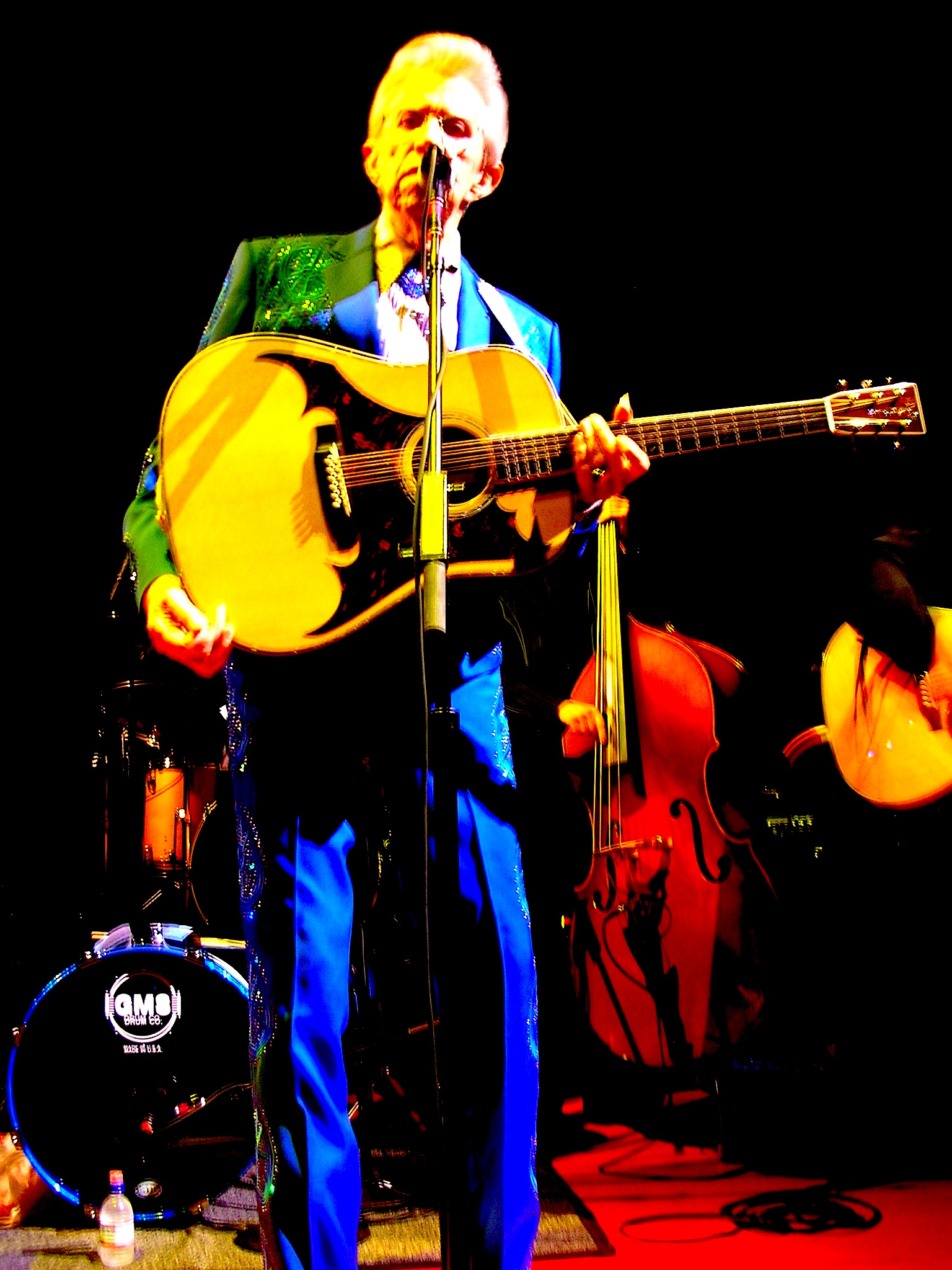
WAGON TRAIN: Porter Wagoner, opening for the White Stripes, Madison Square Garden, Last Night
 BY AMY Z. QUINN For the life of me, I couldn’t remember the name of the dude with the Siegfried & Roy hair playing playing twang-tastic guitar behind Porter Wagoner. I got to my seat just after they came on, as he was singing Wagoner to the stage: “The Wagonmaster’s comin’, the Wagonmaster’s comin’ . . .” and, tragically bereft of an Internet-ready device with which to google, the solution finally came to me. Time to call Mom. She’s a country fan from way back when it was still called Country & Western; I knew who Jim Reeves was before I knew how to read. I’m convinced she only agreed to babysit for me last night because she heard Porter was involved. “Oh my God,” she said. “Be sure to get a good picture of his Nudie suit.”
BY AMY Z. QUINN For the life of me, I couldn’t remember the name of the dude with the Siegfried & Roy hair playing playing twang-tastic guitar behind Porter Wagoner. I got to my seat just after they came on, as he was singing Wagoner to the stage: “The Wagonmaster’s comin’, the Wagonmaster’s comin’ . . .” and, tragically bereft of an Internet-ready device with which to google, the solution finally came to me. Time to call Mom. She’s a country fan from way back when it was still called Country & Western; I knew who Jim Reeves was before I knew how to read. I’m convinced she only agreed to babysit for me last night because she heard Porter was involved. “Oh my God,” she said. “Be sure to get a good picture of his Nudie suit.”
Finally, as the Wagonmaster kicked up “The Green, Green Grass Of Home,” I rang her up:
ME: Mom, I’m here at Porter Wagoner and I need your help with something.
MOM: Is that ‘The Green, Green Grass Of Home’ I hear in the background?
ME: Yes, but I need your help with something. There’s a guy playing guitar with him and I know who he is but can’t remember his name and it’s driving me crazy.
MOM: Tell me about Porter’s suit. Is it fabulous? What about the shoes?
ME: Yes, it’s gorgeous — royal blue, sparkly of course. Light-colored sparkly boots, the hair is perfect of course. You’d be in heaven.
MOM: You know about him and Dolly, right?
ME: Yes, Mom, I think you told me that story when I was five.
MOM: Well, you know neither of them would ever confirm anything but she did write that song . . .
ME: MOM! The guy playing guitar. Big hair, kinda short, I think he used to be married to Johnny Cash’s daughter? Kinda looks like Ricky Skaggs with a bigger, darker hairdo.
MOM: Oh, Marty Stuart. Is he there too?
Right, Marty Stuart, who produced and co-wrote Wagoner’s new album, The Wagonmaster, and whose band, the Fabulous Superlatives, backed the legend in elegantly rocking style. Didn’t I read that on Phawker?
At this point it, uh, got really loud and I had to hang up. I did call her again this morning, though, and was happy to report that ol’ Porter, now gray of pompadour but in the most stately-yet-swingin’ way possible, is the living embodiment of that old saw about how there might be snow on the roof, but there’s still a fire in the furnace. Wagoner’s most famous songs are mid-tempo story songs like “I’ve Enjoyed As Much Of This As I Can Stand” and “The Cold Hard Facts Of Life,” tales he spun to much younger but respectful ears. His voice hasn’t aged so much as it’s been burnished, and despite his body’s 80-year-old appearance of frailty, Porter Wagoner is still the man who wears the suit — never the other way around.
“The Rubber Room,” Wagoner’s 1972 tale of mental illness, brought the Garden to a complete hush. Seems like the kids today hear plenty of songs about people on lockdown and the glory/agony associated with it, but a dispatch from a man in an insane asylum is something almost . . . new.
Am I the only person in the world who sees nothing at all weird, nothing at all difficult to understand, about the relationship between Jack and Meg White? Bandmates, yes, but also once a married couple — both using her surname, not his — who now call each other brother and sister, the collective thought about the Whites is that there’s something askew, maybe even creepy, about their partnership. Former couples playing in bands together isn’t a new thing (the McVeighs, Stefani/Kanal, etc.) but to call each other “brother and sister” even after the world knows your backstory — And she was the maid of honor at Jack’s wedding a few years back? Hmmm.
What I saw last night were two people so utterly comfortable with each other, so sure of what they can accomplish together, that their fairly small physical presence and the musical output of just two instruments, on songs like “I’m Slowly Turning Into You” and “You Don’t Know What Love Is (You Just Do As You’re Told),” can easily fill the yawning expanse of an arena. (In fact, when Jack turned “Jolene” into psychosexual tantrum of squalling guitar and throat-shredding spleen-venting, well, let’s just say it actually felt a little claustrophobic inside the Big Apple’s vaunted Enormodome.)
Guitar, drums, voices, and two people who obviously need each other. A family. Pretty straightforward.
And you’ll note I said “need each other.” The prevailing wisdom on Meg White seems to be that she’s there only to be a foil for Jack, with people sneeringly wondering whether he writes the drum parts for her (as if that matters, actually), as if she’s little more than a performing doll, the little plastic ballerina who twirls only when you open the lid of the jewel box. Bullshit. This woman is far more sure of herself than her doe-eyed persona suggests, with far more skill as performer than her detractors allow. The importance of her presence to the expression of Jack’s furious genius is infinitely greater than any of us probably suspect.
Nobody claims Meg White has the strongest female voice in rawk, but she steps confidently to the mic when it’s her turn to sing. And it struck me as somehow touching how, during her turn on the plaintive “In The Cold, Cold Night,” Jack not only stayed in the background, but sat and played with his back turned to the audience.
That’s called respect.
[Photo by JONATHAN VALANIA]
